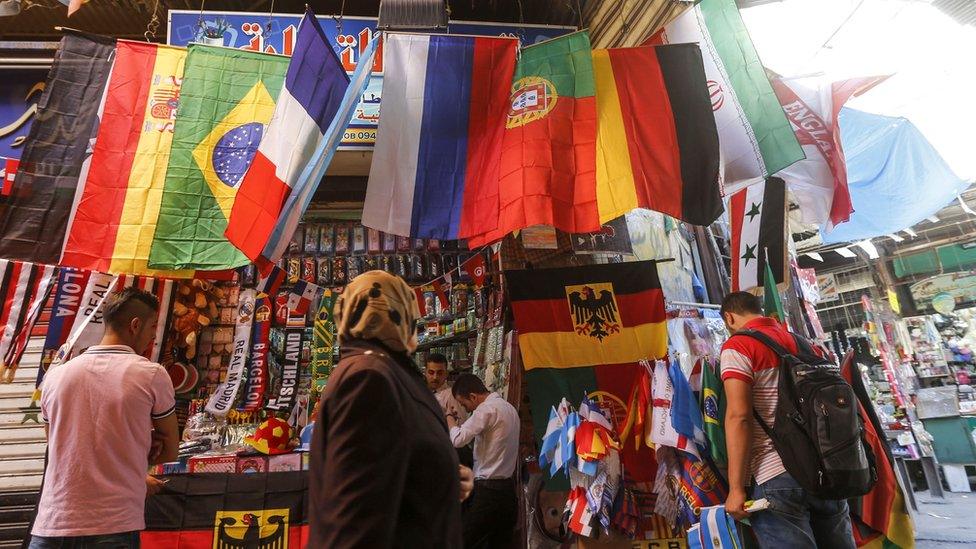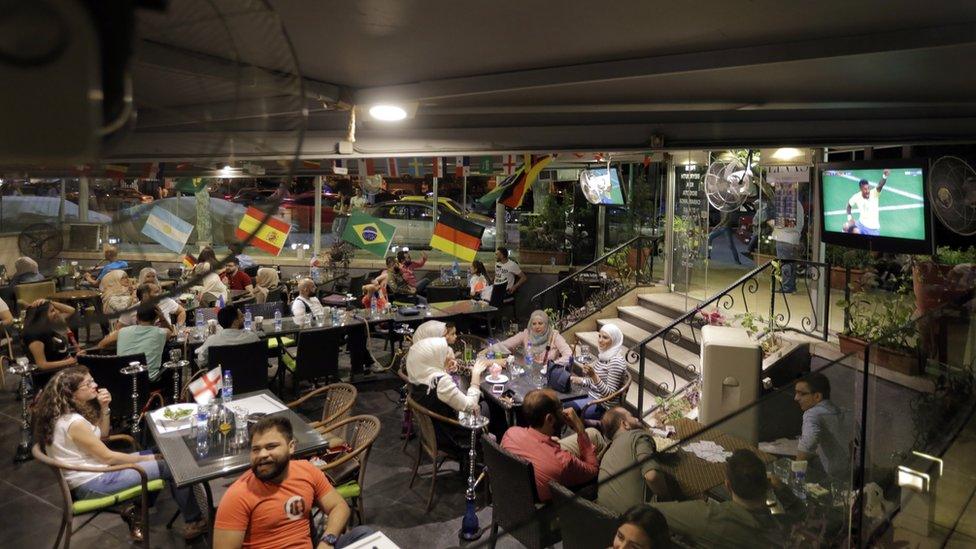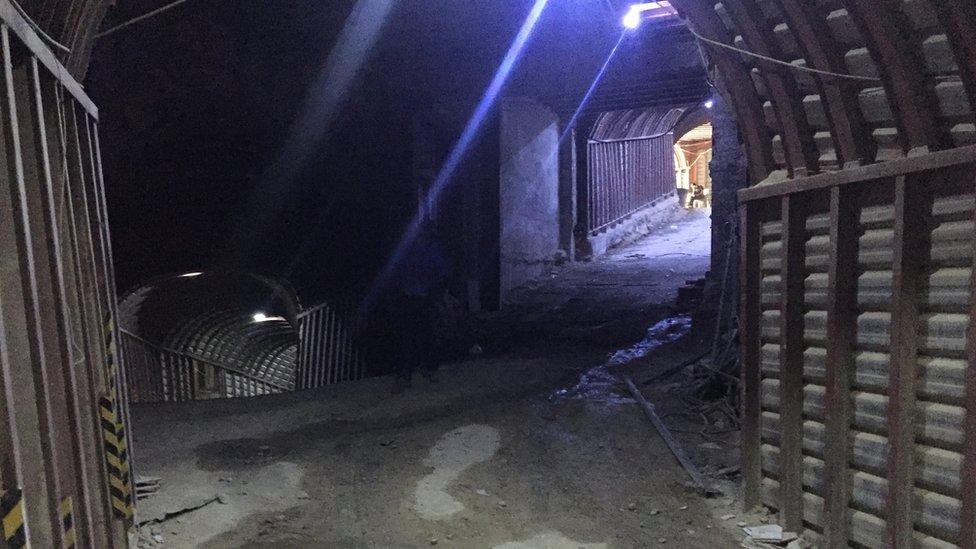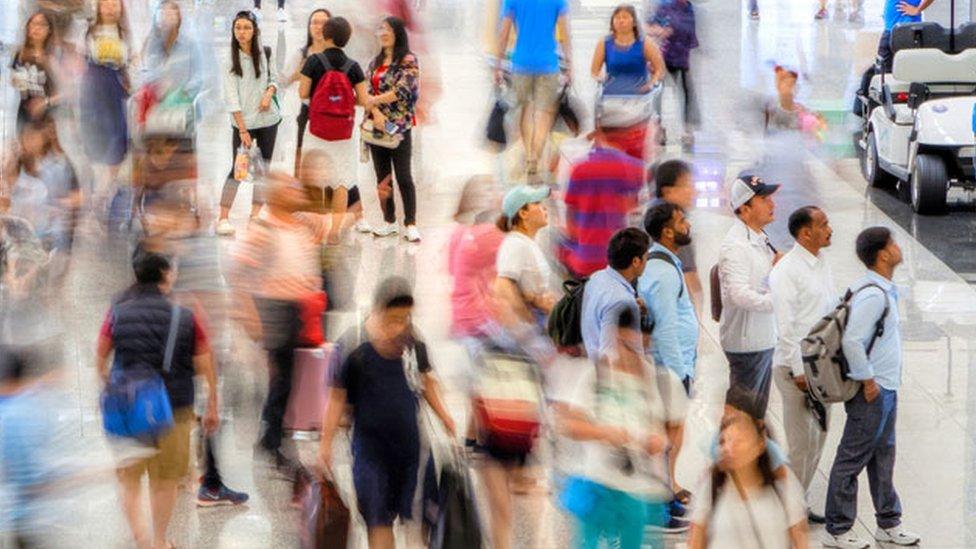Syria: The unstoppable momentum of Assad’s war
- Published

A shop in the old city of Damascus sells flags of the World Cup teams
Damascus feels different. The centre of the city was barely damaged in the last seven years of war, unlike many of the suburbs, which have been turned into rubble.
But the soundtrack of the war almost always accompanied daily life: air and artillery strikes on the suburbs, and much less powerfully, shelling coming from the rebel forces.
However, since the fall of Eastern Ghouta, the big rebel enclave on the edge of Damascus in the spring, all that has changed.
The war is still in the minds of the people, dominating lives. But physically it is elsewhere, concentrated at the moment in the south, close to the border with Jordan and the boundary with the Golan Heights, Syrian territory occupied by Israel since the 1967 Middle East war.
In the Christian quarter of the old walled city, the narrow streets and narrower alleys are packed with people. Shops and restaurants are open and busy. Bars have big screens ready for another evening of games at the World Cup.

Cafes in Damascus are showing World Cup matches
Back in March, when I was here last, I interviewed a teenage girl whose leg had been blown off by a mortar, fired from rebel positions, which landed in the same streets.
A much heavier weight of fire was directed at Eastern Ghouta - at the rebels who controlled it, and the civilians who had the bad luck to be living there. The fire came from the Syrian Arab Army, its allied militias and its Russian allies.
It is now possible, with official permission and a military escort, to visit the ruins of Eastern Ghouta. Damage is everywhere.
The areas closest to the front lines are worst. Concrete blocks of flats, half a dozen or so storeys high, are smashed and perforated by shell holes, and often gutted by fire too.
The main armed group in Eastern Ghouta, Jaish al-Islam, constructed an alternative subterranean life. It dug tunnels that linked concrete basements. The workmanship was remarkable, considering the tunnels were built in an enclave that was effectively under siege from the end of 2011 to only a few months ago.
Some of the tunnels are big enough for a medium-sized van to be driven along them. An underground hospital that was packed with the dead and the dying during the worst of the shelling is still open, under the flags of Syria and Russia. It still functions, treating children who have hurt themselves playing on bomb sites.

One of the tunnels built under Eastern Ghouta
In the end, Jaish al-Islam's organisation was not enough to resist the tenacity and ruthlessness of the Syrian armed forces, and the firepower of the Russians. In the last few years most of the armed groups in Syria lost the backing of outside powers.
Earlier in the war, the US, Britain, as well as Turkey, the Saudis and Qatar, to varying degrees, helped train and arm rebels who wanted to overthrow President Bashar al-Assad. Everything changed after 2015, when Russia intervened decisively in the war.
The men who built the tunnels under Eastern Ghouta expected to win. They were wrong, though for a while it looked as if they might be right. But with the fall of Eastern Ghouta, and a few other small enclaves around Damascus, the regime has built up formidable momentum.
President Assad and his generals have been ostracised and sanctioned by the Western world, the Saudis and others. But after seven years they are closing in on victory in the conflict that started in March 2011 in Deraa, south of Damascus on the border with Jordan.
The town is now the focus of an offensive by government troops, supported by the Russians. They are aiming to recapture a broad section of southern Syria from the rebels. Leaflets have been seen in Deraa, referring back to the first demonstrations, stating that the uprising began in the city and it would be buried there.

Control of south-western Syria (27 June 2018)
At the time of writing, something like 270,000 civilians (according to UN figures) have been displaced by the fighting. They are not being allowed into Jordan, or the Golan Heights. The UN and the International Committee of the Red Cross have issued grave warnings about the threat to life.
The Syrian army's tactics are now familiar. Heavy military pressure is accompanied by talks for "reconciliation", which is another word for a negotiated surrender.
Some groups that have opposed the regime for years are complying. Others insist they will fight on. It is hard to see how the battle can be sustained for more than a short time against the firepower of the Syrian army and the Russians.
Behind the fighting is a bigger reality. The Assad regime believes it has almost finished off its enemies. It cannot do much about the big powers who have troops in parts of Syria, particularly Turkey, the United States and their allies.
But the armed groups who claim descent from the first demonstrators in Deraa in March 2011 are fighting their last battles.
Syria's bloodshed, Syria's wars, its smashed cities, continue to break lives. But the Assad regime's fight for survival is almost done.
- Published5 July 2018

- Published7 January
